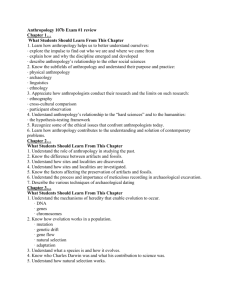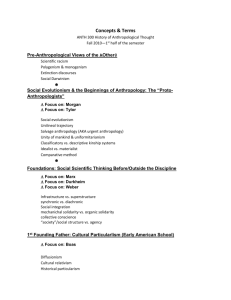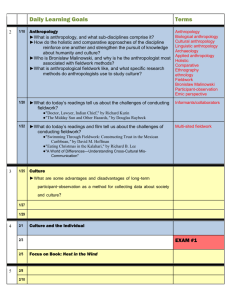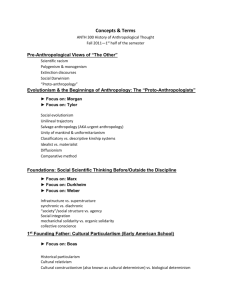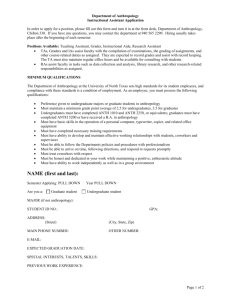BA-Anthropology-Semester-Syllabus-2015-16
advertisement
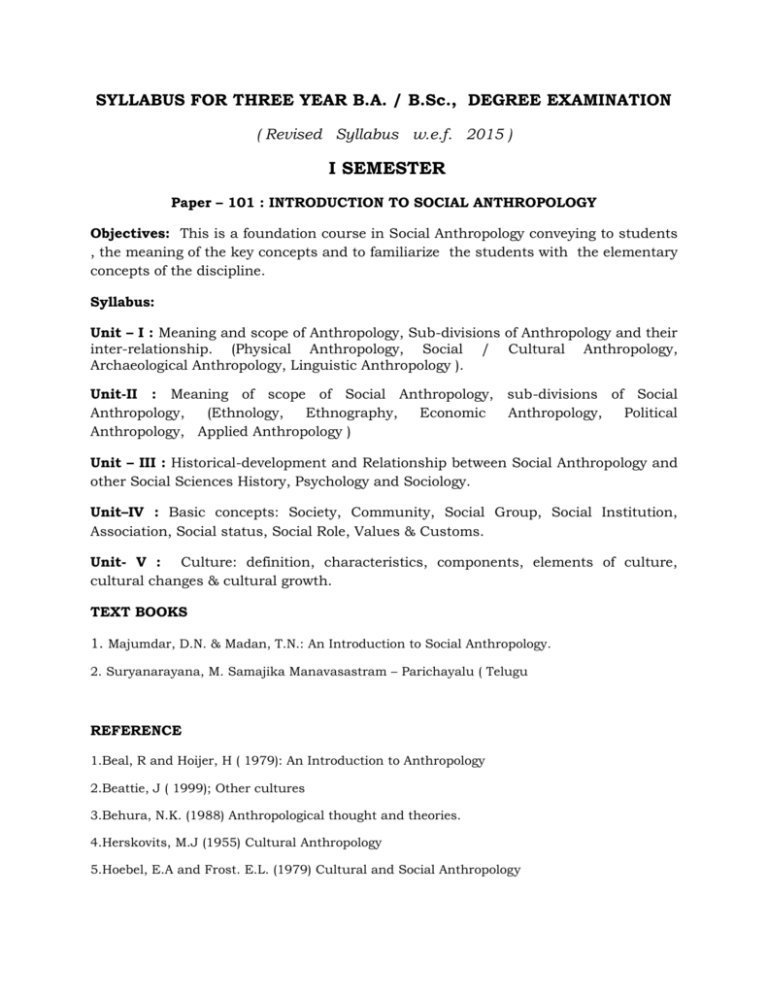
SYLLABUS FOR THREE YEAR B.A. / B.Sc., DEGREE EXAMINATION ( Revised Syllabus w.e.f. 2015 ) I SEMESTER Paper – 101 : INTRODUCTION TO SOCIAL ANTHROPOLOGY Objectives: This is a foundation course in Social Anthropology conveying to students , the meaning of the key concepts and to familiarize the students with the elementary concepts of the discipline. Syllabus: Unit – I : Meaning and scope of Anthropology, Sub-divisions of Anthropology and their inter-relationship. (Physical Anthropology, Social / Cultural Anthropology, Archaeological Anthropology, Linguistic Anthropology ). Unit-II : Meaning of scope of Social Anthropology, sub-divisions of Social Anthropology, (Ethnology, Ethnography, Economic Anthropology, Political Anthropology, Applied Anthropology ) Unit – III : Historical-development and Relationship between Social Anthropology and other Social Sciences History, Psychology and Sociology. Unit–IV : Basic concepts: Society, Community, Social Group, Social Institution, Association, Social status, Social Role, Values & Customs. Unit- V : Culture: definition, characteristics, components, elements of culture, cultural changes & cultural growth. TEXT BOOKS 1. Majumdar, D.N. & Madan, T.N.: An Introduction to Social Anthropology. 2. Suryanarayana, M. Samajika Manavasastram – Parichayalu ( Telugu REFERENCE 1.Beal, R and Hoijer, H ( 1979): An Introduction to Anthropology 2.Beattie, J ( 1999); Other cultures 3.Behura, N.K. (1988) Anthropological thought and theories. 4.Herskovits, M.J (1955) Cultural Anthropology 5.Hoebel, E.A and Frost. E.L. (1979) Cultural and Social Anthropology II SEMESTER Paper – 201 : SOCIAL INSTITUTIONS Objectives: Students of Anthropology are supposed to be experts in human societies. In other words, they should know of the basic concepts that are used in such societies as well as the basic constituent units. This paper is designed to give them a grounding is such basic concept using examples from within and outside India. The skills pirated from the class should be useful to the student in analyzing any society in terms of the components and collect data regarding these units. Syllabus Unit-I : Definition of marriage, characteristics, forms and functions of marriage, ways of acquiring mates in primitive societies. Unit-II : Basic Concepts: Exogamy and Endogamy. Basic ideas of incest. Theories of Incest. Unit-III : Definition of family, types and functions of family, universality of family. Unit-IV : Indian joint family, Impact of industrialization, Urbanization, education and modernization on the family. Unit- V : Nature of kinship, degree of kinship, kinship terminology, kinship groups: Lineage, clan, phranty, Moiety; kinship-Application. TEXT BOOKS 1. Majumdar, D.N. & Madan, T.N.: An Introduction to Social Anthropology 2. Suryanarayana, M. Samajika Manavasastralu – Parichayalu ( Telugu REFERENCE 1.Beal, R and Hoijer, H ( 1979): An Introduction to Anthropology 2.Hoebel, E.A and Frost. E.L. (1979)Cultural and Social Anthropology 3.Howards, Michael, C ( 1989 ): Contemporary Cultural Anthropology 4.Kottak, C.P ( 1991 ) : Cultural Anthropology 5.Haviland, W.A ( 1991 ) : Cultural Anthropology.


